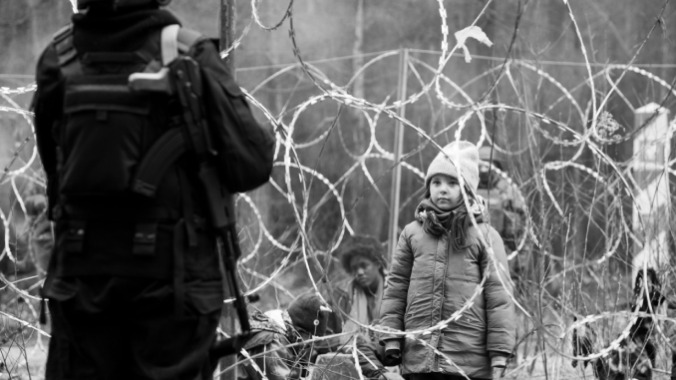Resonant Drama Green Border Finds Compassion in Crisis

Green Border is at its most effective when its medium is the message. Stilling, frantic images shot through a bird’s-eye lens in black-and-white recall war films such as Schindler’s List, imbuing the contemporary conflict at the center of the film with a larger, historicist scope.
Perhaps more importantly, these images toe the line between an observational and experiential subjectivity, in which we are both inundated by a documentary-style realism as well as an acutely focused, first-hand experience of bodily movement—particularly within the contested border that threatens migrants’ ability to do so. We both understand the precarity of their very existence and embody their immediate, multisensory experiences of danger. In a world marred by the tragedy of displacement—casualties of myriad geopolitical, colonial and economic interests—Green Border’s resonance speaks for itself.
Agnieszka Holland’s Green Border, which won the Special Jury Prize at the Venice Film Festival, chronicles the sweeping, myriad effects of the Belarus-European Union border crisis of 2021. A panoramic view of the crisis, the film initially centers a group of refugees whose origins span from countries in the Middle East and Africa. The multinational group is lured into border crossing by the rhetoric of Belarusian president Alexander Lukashenko, who promises migrants easy access into the European Union.
The group of refugees are rendered a vehicle for the whims and machinations of Poland and Belarus, with officers of both countries tossing them from border to border. Disorder and disorientation is harrowingly depicted in sharp, sensory fashion, with the refugees’ agility and perseverance being steadily, gradually beat down. Holland’s lens portrays dislocation as multipronged, the physical, spatial and psychological implications of it all bleeding into each other.
The filmmaker is careful not to etch the migrants in the film as one-note or from a morally righteous perspective. At one point, Afghani teacher Leila (Behi Djanati Atai), trudging through a swamp, falls in. She accepts a hand of help to rescue her, but Holland’s subjectivity remains focused on the peril of the muddy green ruins, even as Leila allows a teenager to descend under its surface. The scene isn’t infected by overt sentimentality, only by the sense that this is an unremarkable, mundane moment for Leila. It’s one fatality of many that she has been made to endure.
As Green Border plods along, it incorporates various other Polish fixtures into the fold, including border officer Jan (Tomasz Włosok) and psychologist Julia (Maja Ostaszewska). It is through this transition of focus that Green Border loses a bit of its keen eye. Though Jan and Julia’s periphery to the conflict mirrors that of the (likely) Western viewer, their characters are comparatively thin; this is perhaps ironic, considering that, compared to the more documentarian focus on the migrants, they have such obvious characterization. It is precisely this narrativizing, though, that likens them to stock characters more than anything else.
For instance, Jan is forced to grapple with the patent propaganda of his superiors. “They aren’t people; they are weapons of Putin and Lukashenko. They aren’t people; they’re live bullets,” his regiment officer says. Jan and his compatriots later discuss the crisis and their key roles in it, but Jan feels like more of a stand-in for the average Polish officer than a particular human with his own opinions, his own feelings. Perhaps this is the point, though Holland’s insistence on delineating particular individuals’ arcs seems paradoxical to this. It is ironic that Holland’s specialized treatment here amounts to figures less tangible and less real than the multitude of asylum seekers she follows. Even the ones who flicker only briefly on screen feel truer to life.
There’s a sequence midway through the film, in which Holland records Polish humanitarian workers recording videos from the asylum seekers. It’s one of the most piercing scenes in Green Border, and the moment in the film that makes the best use of its multi-dimensional look at the border crisis. The video cuts between various narratives, threading them together—one Iranian refugee discusses his sexuality, his desire to be fully himself in a nation that would hang him for doing so; another recounts ISIS flogging him for smoking during the month of Ramadan.
The devastating accounts shown here penetrate in all the ways the Polish characters’ arcs don’t, particularly because they refuse neat narrativization; narrative is weaved together through specificity rather than through a reliance on tropes or banalities. There’s also a great deal of metatextual inquiry embedded within them. Is acknowledgment of a group’s pain enough to mobilize a larger struggle? Are we participants in their pain when we simply watch or record? At times, Green Border appears to simplify the humanitarian organizations it depicts, but these subtle questions suggest more complicated dimensions at the peripheral corners of the conflict.
Nevertheless, Holland’s choice of black-and-white cinematography is a striking one, an indication of a filmic and ideological continuity with her previous works Angry Harvest and Europa Europa, each of which relate Holocaust-set stories. In Green Border, her images of the present are coded with the pain of years past, if only to say—in compassionate, non-instructive fashion—that we ought not to repeat the machinations of death and destruction. We would do well to listen.
Director: Agnieszka Holland
Writer: Agnieszka Holland, Gabriela Łazarkiewicz-Sieczko, Maciej Pisuk
Stars: Jalal Altawil, Maja Ostaszewska, Behi Djanati Atai, Tomasz Włosok, Mohamad Al Rashi, Dalia Naous, Maciej Stuhr, Agata Kulesza
Release Date: June 21, 2024
Hafsah Abbasi is a film critic who has covered the Sundance Film Festival and the Mill Valley Film Festival in years past. She currently resides in Berkeley, California. Find her latest writing at https://twitter.com/hafs_uh.